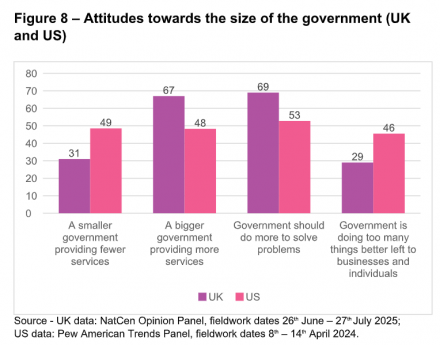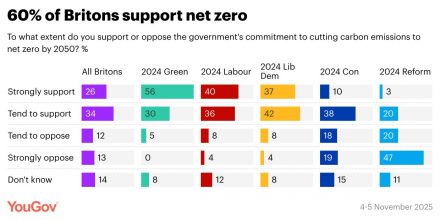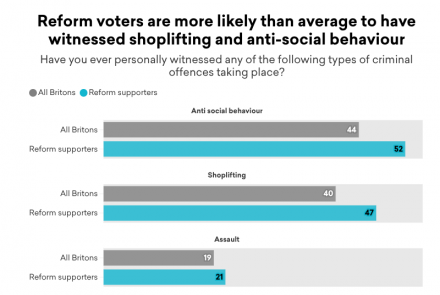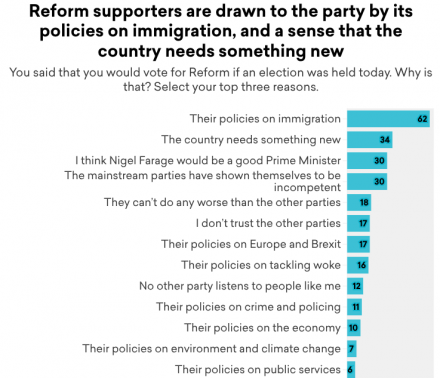
“Today is just the start of something very big indeed,” Nigel Farage declared this week as he unveiled the new Small Business for Reform group.
Reform is ramping up its war on new fronts beyond immigration. After taking Westminster by storm on Brexit and borders, could Farage eventually force rival parties into submission on other policy battlegrounds too?
With new research giving clues on where Reform might succeed – or not – by mirroring the US right’s much wider conservative agenda, LabourList asked pollsters, MPs and trade unionists their verdict.
Could Reform copy the US right playbook?
If Reform is to vanquish the Tories as Britain’s party of the right, there remains one “final piece of the puzzle”, according to pollster Sophie Stowers.
Her recent research for More in Common found just 29% of Reform supporters rule out voting Tory. She argues Farage needs to deepen and widen support from two “Reform-curious” groups – once-loyal, socially conservative Tory voters, and economically and socially liberal floating voters.
Recent developments seemingly signal Reform’s desire to address this, and counter the idea it’s a one-trick pony on immigration.
Take abortion. Reform recently appointed James Orr, said to be opposed in all circumstances, as a senior adviser. Last month the New York Times also reported a leading US Christian right group – famous for helping overturn Roe vs Wade – had organised meetings between Farage and US policymakers. Farage called abortion “No. 468” on Reform’s agenda – but said “maybe we need to rethink” the 24-week limit.
Meanwhile Farage recently said heterosexual relationships are the “most stable”, defending colleague Danny Kruger – who once called them the “only possible basis for a safe and successful society”. Some Reform councils have banned Pride flags.
Stowers said she was surprised how much she heard abortion discussed among attendees at Reform’s conference, and suggested the party could be “testing the water” for a new strategy. The Guardian’s Zoe Williams even fears abortion could be Reform’s next successful frontier.
Reform voters back gay marriage and abortion
A new study suggests otherwise, however. Around three in five UK voters – and even Reform voters – back gay marriage, and four in five say abortion should be legal in all or most cases. Reform voters’ support for both is only a few percentage points below average.
UK support is also well above US support, the National Centre for Social Research (NatCen) report found.
“There’s no public market for that, even in a socially conservative area like mine,” one Labour MP says of gay marriage.
Given Farage’s comments on marriage yesterday, worth saying that levels of support for same-sex marriage among Reform supporters are almost double those who oppose it, and not far off the national average. pic.twitter.com/pJVFALk0xU
— Luke Tryl (@LukeTryl) September 16, 2025
NatCen’s Curtis Jessop said it was “probably not surprising” given greater religiosity in the US. “There is a smaller pool of ‘socially conservative’ people for Reform to fish in. While it may appeal to some, focusing on these issues risks alienating others.”
Hence Labour’s full-throated attacks, perhaps. A spokesperson said of Orr’s appointment: “Reform’s reckless plans risk taking us backwards.” Reform did not respond to a request for comment.
Thatcherism with a grin
Another mantle Farage is jostling for is as the small business, small-state party. This week he condemned the idea “employers are the bad guys” in a seeming further attack at Labour’s workers’ rights reforms – and backed “substantial spending cuts” and deregulation.
It appears another dead end, however. TUC general secretary Paul Nowak told LabourList: “In every constituency, there’s majority support for key provisions of the employment rights bill. That includes Clacton-on-Sea. Support is highest among Labour-to-Reform switchers – and likewise on taxes on wealth.”
“We are being mature, we are being sensible and we are not overpromising,” Nigel Farage says as he outlines Reform UK’s economic planshttps://t.co/aW7bLE5Ik6 pic.twitter.com/Te0cOkby9Q
— BBC Politics (@BBCPolitics) November 3, 2025
TUC polling shows as much. MPs in Labour-held seats where Reform is polling well agreed – but argued Labour must capitalise more.
“Farage isn’t a man of the people; he’s a man of the establishment,” said Lorraine Beavers.
“He needs to be named and shamed.”
Nowak and Karl Turner said Labour should be louder promoting such policy, but Turner feared some voters “aren’t listening”. Stowers noted awareness of employment reforms is low.
READ MORE: Why don’t Labour’s workers’ and renters’ rights reforms cut through?
Turner said he hoped workers would gradually start noticing direct benefits from reforms, though.
Jon Trickett agreed Farage is “in the completely wrong place”, but argued delivering “big change” was more vital than criticising Farage.
Public spending: uneven terrain for all parties
As for public spending, Jessop noted NatCen’s research found 67% of UK respondents want bigger government providing more services, versus 48% in the US.
Stowers’ own recent analysis of Reform’s coalition also found two-thirds of Labour-to-Reform switchers back income redistribution. Reform voters are “very protective of spending on disabled, severely ill and elderly people”, and especially opposed to Labour’s PIP cuts.

Could Reform’s new £9bn benefit crackdown backfire, then?
The jury’s out. Jessop calls attitudes towards public spending and welfare “complex”. Trickett said the extent of support he received opposing winter fuel cuts surprised even him. Yet Turner said a local Labour member recently objected to breakfast clubs for all schools, surprising him too.
New polling shows voters are more likely than US voters to say government is wasteful and inefficient.
With Rachel Reeves indicating that she will scrap the two-child benefit cap, 57% of Britons (including 50% of Labour voters) say they want to keep it in place
Keep cap: 57% (-2 from Sep)
Abolish cap: 28% (+3)2024 Labour voters
Keep cap: 50% (-3)
Abolish cap: 37% (+4)Results… pic.twitter.com/h0YZCUub9l
— YouGov (@YouGov) November 11, 2025
Morgan Wild, chief policy adviser at Labour Together, said British people were “incredibly generous” towards those who have paid into the system or desperately need help – but “very sceptical” the state had correctly identified them.
Most voters back the two-child benefit cap, suggesting Labour’s rumoured U-turn could backfire too.
One idea now gaining traction to see off the right threat on welfare is a step towards an insurance model for unemployment benefits.
A recent Labour Together report by Wild advocated higher benefits for those paying in more, with an emphasis on contribution to shore up support for welfare per se.
A two-tier system may alienate some on the left, but Wild calls it “European-style social democracy”.
Climate: another grey area
Climate is another battleground where voters’ openness to Reform’s advances remains unclear. On the one hand, Reform voters “don’t like net zero because of cost and speed”, fearful adaptation costs will hit them, Stowers said.
That would suggest opportunities for arch-critic Farage, particularly with the government ratcheting up green initiatives amid a hostile media reception.
Subscribe here to our daily newsletter roundup of Labour news, analysis and comment– and follow us on Bluesky, WhatsApp, X and Facebook.
Yet this week a YouGov poll found 60% of voters back the government’s pledges. Beavers said voters know net zero is “the way we create jobs”, whereas Reform’s enthusiasm for fracking is “not where voters are”, according to Stowers. Even Labour-to-Reform switchers back net zero.

Crime could pay for Reform
Crime feels less discussed on the left as a weak spot for Labour (recent prisoner releases aside). Common right-wing memes about London are often mocked.
But arguably it’s here Reform could make major strides. Its attacks on Sadiq Khan suggest it knows it.
Three-quarters of voters say justice isn’t tough enough, NatCen found. More UK voters want tougher measures than US ones, though the death penalty and incarceration rates likely explain the gap.
Surveys suggest perceptions of rising crime over the past decade, nationally and in London. It likely reflects not only right-wing attacks, but actual rises in violent crime in London and nationally and personal experiences or viral footage of particular crimes – even if many crimes have fallen in recent decades, and Khan points to some positive trends.
Crucially, the “Lawless Britain” theme Farage campaigned on this summer does reflect most Reform supporters’ views, and crime is a “core issue”, according to Stowers’ report.

Reform’s coalition make uncomfortable bedfellows
Reform similarly mirrors public opinion more on trans rights, with two-thirds of Brits and Americans say sex at births defines being a man or woman.
Yet Labour loyalists might say the party’s rightward shift in recent years – on not just gender identity but fiscal responsibility and aspects of crime and welfare – is and will keep fending off Reform on new fronts.
Crucially, many potential battlegrounds simply aren’t Reform supporters’ priorities. Stowers said it gives Labour some “breathing space”.

What’s more, Reform’s coalition is particularly hard to unite beyond immigration. One MP noted an “inherent contradiction” between two tribes, contrasting middle-class, Thatcherite Daily Mail readers with former Labour voters receiving benefits the first group want slashed. Labour switchers back regulation, tax-and-spending and net zero far more than Tory switchers, Stowers added.
Reform’s recent pro-business push could reflect assumptions Red Wall voters are “in the bag”, she said, but may “inadvertently jeopardise” new supporters’ “transactional” loyalty.
Two key nuts to crack for Labour
Equally, one MP argued that if Labour could “move the dial” on illegal immigration many voters could revert to Labour or the Tories. Stowers agreed, provided Labour shows tangible progress on a second key voter priority – living costs.
The inverse remains true, though. Not winning back trust on migration means not winning the next election. The Tories’ fate suggests that turnaround is no mean feat.
Share your thoughts. Contribute on this story or tell your own by writing to our Editor. The best letters every week will be published on the site. Find out how to get your letter published.
-
- SHARE: If you have anything to share that we should be looking into or publishing about this story – or any other topic involving Labour– contact us (strictly anonymously if you wish) at [email protected].
- SUBSCRIBE: Sign up to LabourList’s morning email here for the best briefing on everything Labour, every weekday morning.
- DONATE: If you value our work, please chip in a few pounds a week and become one of our supporters, helping sustain and expand our coverage.
- PARTNER: If you or your organisation might be interested in partnering with us on sponsored events or projects, email [email protected].
- ADVERTISE: If your organisation would like to advertise or run sponsored pieces on LabourList‘s daily newsletter or website, contact our exclusive ad partners Total Politics at [email protected].




More from LabourList
‘The Sherriff of Wild Westminster: what must change in elections bill’
‘The hope that kills you’: Reflections from the final day in Gorton and Denton
MPs, union leaders and organisations react to ‘bruising’ Gorton and Denton result